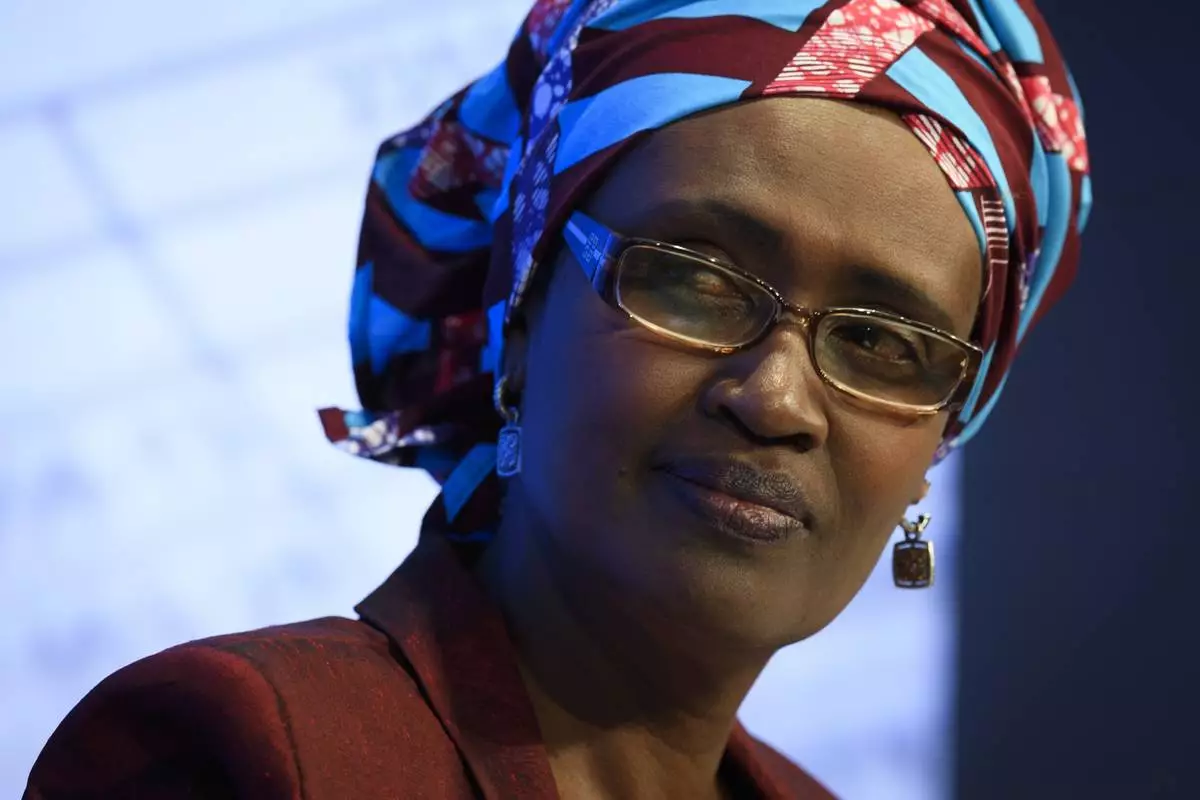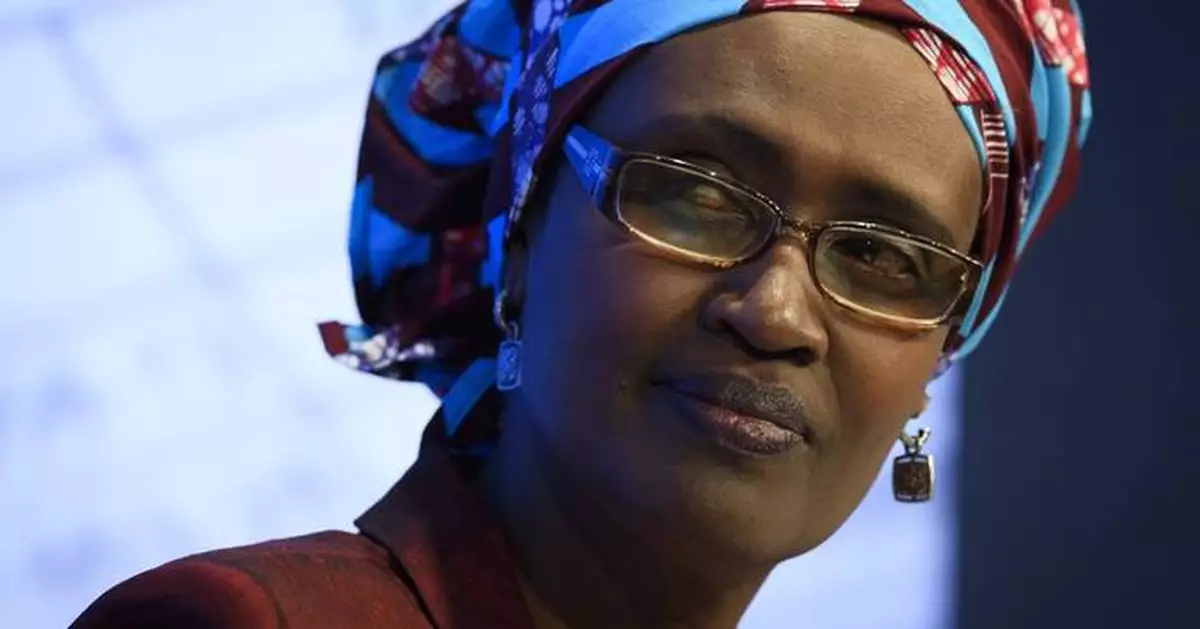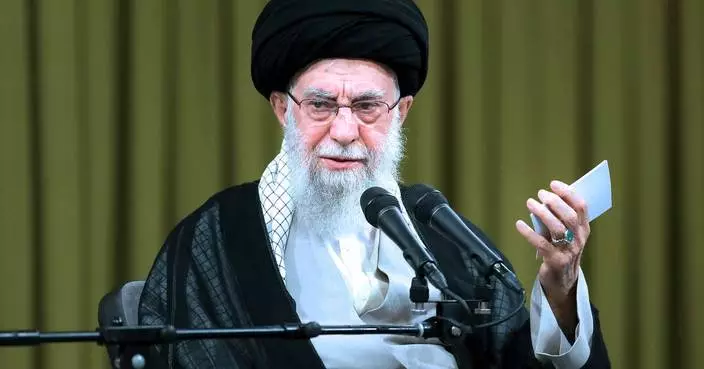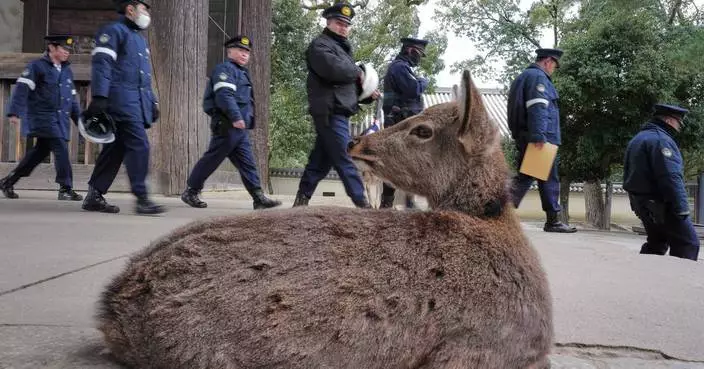GENEVA (AP) —
The head of the U.N. AIDS agency said Monday that the sudden loss of American money has been “devastating” for efforts to stop HIV and will cost many lives of the world’s most vulnerable people. But she also proposed an “amazing deal” for U.S. President Donald Trump that she said could result in “the end of AIDS.”
At a news briefing in Geneva, UNAIDS Executive Director Winnie Byanyima said that the deal would involve Trump enabling the U.S. company Gilead to produce and license its “magical” prevention drug lenacapavir across the world to the millions of people who need it.
Lenacapavir, sold as Sunlenca, has been shown through twice-yearly injections to completely prevent HIV infection in women and which works nearly as well in men.
“President Trump likes deals,” Byanyimasaid, acknowledging that it was President George W. Bush who first started paying for the widespread roll-out of HIV drugs more than two decades ago.
“It could be President Trump, another Republican president, who leads the prevention revolution towards the end of AIDS,” Byanyima said.
She added that the deal would result not only in profits for Gilead and create jobs for Americans, but save millions of lives in poorer countries.
Byanyima said that American money made up about 35% of UNAIDS’ core budget last year but it was unclear whether that might be restored for next year. She said the agency was in talks with the U.S. government but was also preparing for a worst-case scenario, in which there was no funding available from the U.S.
Byanyima said it was unlikely any other donors would be able to fill that vacuum, adding that European donors have told the agency they would be cutting back on their support in order to redirect their funds to defense and other priorities.
Byanyima said that unless support to HIV efforts is restored, there could be more than 6.3 million additional deaths in the next four years and an additional 2,000 people per day becoming infected.
She acknowledged that there has been some valid criticism regarding how HIV aid has been delivered, calling it “an opportunity to rethink and develop more efficient ways of delivering life-saving support.”
Byanyima also said African countries were trying to become more self-sufficient and that even some of the poorest nations were now “trying to stretch very weak, fragile health systems to absorb people living with HIV.”
The Associated Press Health and Science Department receives support from the Howard Hughes Medical Institute’s Science and Educational Media Group. The AP is solely responsible for all content.

FILE - Winnie Byanyima, Executive Director of Oxfam International, attends the 47th annual meeting of the World Economic Forum, WEF, in Davos, Switzerland, Thursday, Jan. 19, 2017. (Gian Ehrenzeller/Keystone via AP, File)
Iran's top judge hinted at fast trials and executions for those who were detained in nationwide protests against the country's theocracy, even as activists said Wednesday that the death toll rose to levels unseen in decades, with at least 2,571 people killed so far.
Iran’s judiciary chief Gholamhossein Mohseni-Ejei, made the comments about trials and executions in a video Tuesday, despite a warning from U.S. President Donald Trump that he would “take very strong action” if executions take place.
The U.S.-based Human Rights Activists News Agency said the number of dead climbed to at least 2,571 early Wednesday. The figure dwarfs the death toll from any other round of protest or unrest in Iran in decades and recalls the chaos surrounding the country’s 1979 Islamic Revolution.
After Trump was informed of the number of deaths, he warned Iran's leaders that he was terminating any negotiations and would “act accordingly.”
Details of the crackdown began emerging Tuesday as Iranians made phone calls abroad for the first time in days after authorities severed communications countrywide when the protests broke out.
Here is the latest:
SpaceX’s Starlink satellite internet service dropped its fees to allow more people to circumvent the Tehran government’s strongest attempt ever to prevent information from spilling outside its borders, activists said Wednesday.
Elon Musk’s SpaceX has not officially announced the decision and did not respond to a request for comment, but activists told The Associated Press that Starlink has been available for free to anyone in Iran with the receivers since Tuesday.
“Starlink has been crucial,” said Mehdi Yahyanejad, an Iranian whose nonprofit Net Freedom Pioneers has helped smuggle units into Iran, pointing to footage that emerged Sunday showing rows of bodies at a forensic medical center near Tehran.
“That showed a few hundred bodies on the ground, that came out because of Starlink,” he said in an interview from Los Angeles. “I think that those videos from the center pretty much changed everyone’s understanding of what’s happening because they saw it with their own eyes.”
Starlink is banned in Iran.
Tens of thousands of mourners thronged the streets near Tehran University for a mass funeral of security forces and civilians on Wednesday.
After Iranian state television reported that 300 coffins would be on display at Tehran University, Associated Press reporters there saw around 100. It wasn’t clear why there was a discrepancy.
Many held Iranian flags and identical photos of Ayatollah Ali Khamenei and their relatives. The caskets, covered in Iranian flags, were stacked at least three high in the backs of trucks and covered with red and white roses and framed photographs of people who were killed. The crowd chanted and beat their chests in response to an emcee speaking from a stage.
One man in the crowd held up a photo of U.S. President Donald Trump during the Pennsylvania assassination attempt, emblazoned with: “The arrow doesn’t always miss!”
The presenter, his voice booming across the crowd, blamed the U.S. for the unrest. “All of our problems are because of America, today’s economic problems are because of American sanctions. Death to America!” he yelled, prompting the same chant from the tens of thousands of people, dressed mostly in black.
India's Embassy in Tehran urged Wednesday all Indian nationals to leave Iran, citing what it called an “evolving situation” in the Islamic Republic.
The statement, posted on X, also advised Indian citizens to remain highly vigilant and avoid areas where protests are taking place.
German police said Wednesday the two climbed over a fence into embassy grounds and tore down an Iranian flag. Both wanted to hoist two pre-Islamic Republic flags but failed, German news agency dpa reported.
They left the grounds when guards used pepper spray and were detained on the sidewalk outside.
The incident happened late Tuesday.
Major Middle East governments were discouraging the Trump administration from waging a war with Iran, fearing “unprecedented consequences” in the volatile region, an Arab Gulf diplomat said Wednesday.
The Cairo-based diplomat, who was given anonymity because he wasn't authorized to speak to the media, said major governments in the region, including Turkey, Egypt, Saudi Arabia and Pakistan, have been “in constant contact” with the U.S. administration over a potential American strike on Iran that could explode into a “full-blown war.”
Such a war will “certainly” have dire repercussions “not only on the Middle East but also on the global economy," he said.
Iranian state television said Wednesday’s mass funeral in Tehran would include 300 bodies of security force members and civilians. The funeral is expected to take place at Tehran University under heavy security.
The U.S.-based Human Rights Activists News Agency said the crackdown killed at least 2,571 people. It said 2,403 of the dead were protesters and 147 were government-affiliated. Twelve children were killed, along with nine civilians it said were not taking part in protests. More than 18,100 people have been detained, the group said.
Gauging the demonstrations and the death toll from abroad has grown more difficult. The Associated Press has been unable to independently assess the toll, given the communications being disrupted in the country.
Melanie Lidman contributed from Jerusalem.
Trump’s decision to impose a 25% tariff on countries that trade with Iran could impact India, an expert said, as New Delhi already faces existing 50% U.S. trade levies due to its purchases of Russian oil.
Abhijit Mukhopadhyay, a senior economist at the Chintan Research Foundation in New Delhi, said the bigger risk is not India-Iran trade, but India’s access to the U.S. market, as its exports to Iran are modest.
India mainly exports rice, tea, sugar, pharmaceuticals and electrical machinery to Iran, while importing dry fruits and chemical products. Textiles and garments, gems and jewelry and engineering goods are likely to be the most vulnerable sectors, he said.
Trump’s latest move also could affect India’s investments in Iran, including the strategically important Chabahar port, which gives India a trade route to Afghanistan, Central Asia and Europe while bypassing Pakistan, Mukhopadhyay said.
Iran’s judiciary chief signals fast trials and executions for those detained in nationwide protests.
Gholamhossein Mohseni-Ejei made the comment in a video shared by Iranian state television on Wednesday.
He emphasized the need for swift action, saying delays would lessen the impact.
His remarks challenge Trump, who warned Iran about executions in an interview aired Tuesday.
Trump stated the U.S. would take strong action if Iran proceeded with executions. The situation highlights escalating tensions between the two countries over the handling of the protests.
Dozens of Pakistani students studying in Iran have returned home through a remote southwestern border crossing, a Pakistani immigration official said Wednesday.
Federal Investigation Agency spokesperson in Quetta city, Samina Raisani, said about 60 students crossed into Pakistan on Tuesday through Gabd border in Balochistan province with valid travel documents.
More students were expected to return through the same crossing later Wednesday, she said.
Mudassir Tipu, Pakistan’s ambassador to Iran, said Tuesday that Iranian universities had rescheduled exams and permitted international students to leave the country.
The satellite internet provider Starlink now offers free service to people in Iran who have access to the company's receivers, activists said Wednesday.
Mehdi Yahyanejad, a Los Angeles-based activist who helped get the units into Iran, told The Associated Press that the free service had started. Other activists also confirmed in messages online that the service was free.
Starlink has been the only way for Iranians to communicate with the outside world since authorities shut down the internet Thursday night as nationwide protests swelled and they began a bloody crackdown against demonstrators.
Starlink did not immediately acknowledge the decision.

This frame grab from videos taken between Jan. 9 and Jan. 11, 2026, and circulating on social media purportedly shows images from a morgue with dozens of bodies and mourners after crackdown on the outskirts of Iran's capital, in Kahrizak, Tehran Province. (UGC via AP)











